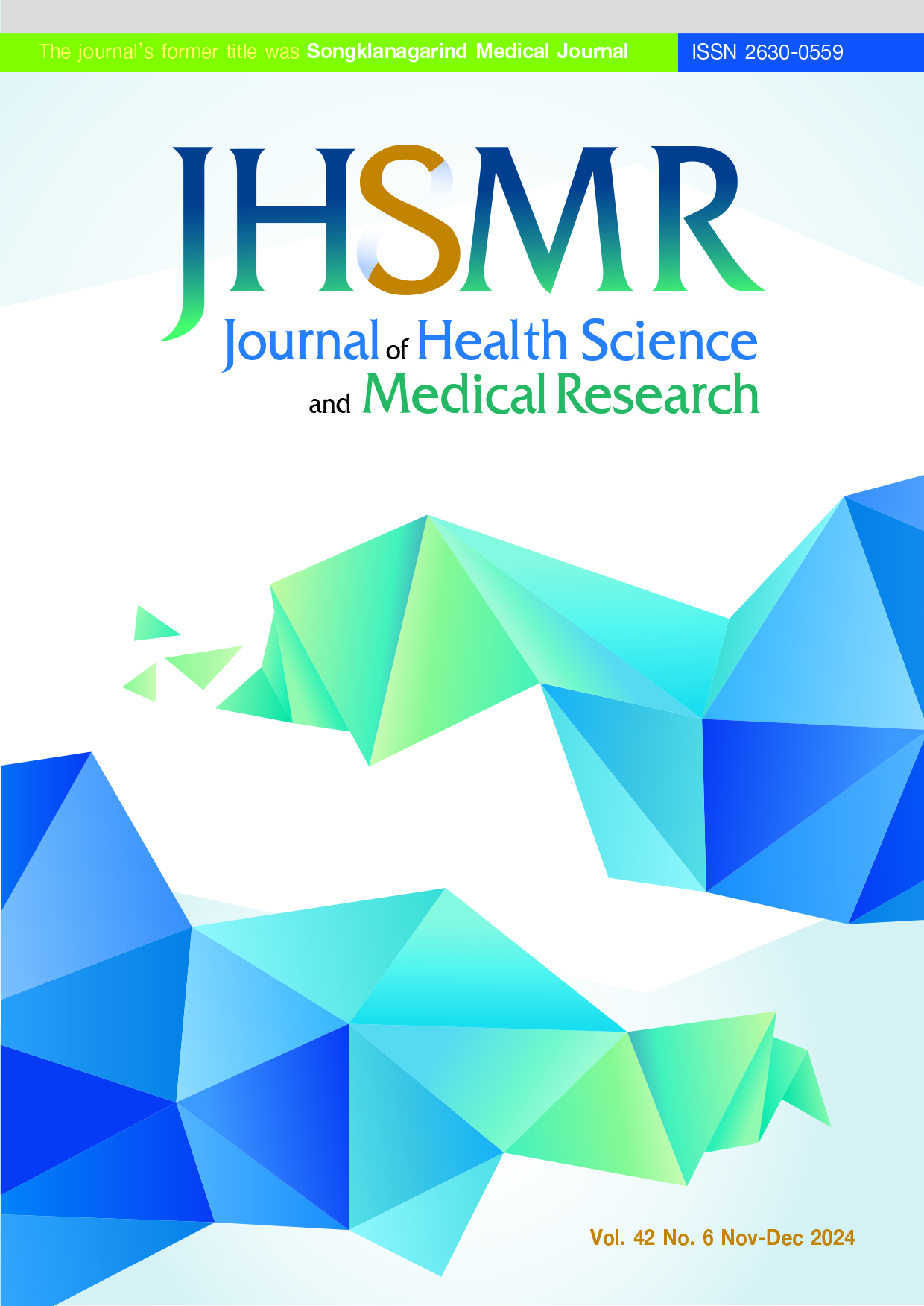Visual Status in Children with Dyslexia at the Integrated Special Education Program in Selangor, Malaysia
DOI:
https://doi.org/10.31584/jhsmr.20241104Keywords:
astigmatism, dyslexia, hyperopia, refractive error, myopia, visual acuity (VA)Abstract
Objective: Dyslexia is a learning disorder, characterized by difficulties in recognizing, decoding, and spelling words. Studies on visual status of individuals with dyslexia have yielded mixed findings. This study aimed to assess visual acuity and refractive errors in dyslexic children in Selangor, Malaysia.
Material and Methods: A cross-sectional study was conducted in the integrated special education program (PPKI) for secondary schools across three randomly selected districts in Selangor. Children with dyslexia from 15 schools were enrolled. Distance and near visual acuity were measured, and non-cycloplegic refraction was performed to identify refractive errors. Descriptive analysis was used to describe the distribution of visual acuity and refractive errors. The Wilcoxon Signed-Rank test was used to compare habitual and corrected visual acuity (VA).
Results: 137 dyslexic children, aged 13 to 19 years, participated in the study. 60% of the participants had good habitual distance VA. Meanwhile, the percentage of good habitual near VA were higher than distance VA. The Wilcoxon Signed-Rank test showed that corrected VA was significantly better than habitual VA. The most common ametropias observed were myopia and astigmatism.
Conclusion: Dyslexic children in the PPKI program generally have good visual acuity and are emmetropic. However, uncorrected refractive error and suboptimal optical refraction were the primary causes of unsatisfactory habitual vision in some children. Findings highlight the need to screen for refractive errors and provide appropriate optical correction to this population to prevent further hindrance to their reading ability.
References
Lim WW, Yeo KJ, Handayani L. A systematic review on interventions for children with dyslexia. Int J Eval Res Educ 2023;12:1674-82. doi: 10.11591/ijere.v12i3.25099.
Nurul Anis MY, Normah CD, Mahadir A, Norhayati I, Rogayah AR, Dzalani H. Interventions for children with dyslexia: a review on current intervention methods. Med J Malaysia 2018;73:311-320.
Handler SM, Fierson WM, Section on ophthalmology; council on children with disabilities; american academy of ophthalmology; american association for pediatric ophthalmology and strabismus; american association of certified orthoptists. Learning disabilities, dyslexia, and vision. Pediatrics 2011;127:e818-56. doi: 10.1542/peds.2010-3670.
International Dyslexia Association. Definition of dyslexia. International Dyslexia Association [homepage on the Internet]. Baltimore: International Dyslexia Association; 2024 [cited 2024 Aug 4]. Available from: https://dyslexiaida.org/definition-of-dyslexia.
Stein J. What is developmental dyslexia? Brain Sci 2018;8. doi: 10.3390/brainsci8020026.
Evans BJW, Drasdo N, Richards IL. Investigation of accommodative and binocular function in dyslexia. Ophthalmic Physiol Opt 1994;14:5-19. doi: 10.1111/j.1475-1313.1994.tb00550.x.
Kristjánsson Á, Sigurdardottir HM. The role of visual factors in dyslexia. J Cogn 2023;6:1-28. doi: 10.5334/joc.287.
Wajuihian SO, Naidoo KS. A comparison of the visual status of dyslexic and non-dyslexic schoolchildren in Durban, South Africa. African Vis Eye Heal 2011;70:29-43. doi: 10.4102/aveh.v70i1.92.
Goulandris N, McIntyre A, Snowling M, Bethel JM, Lee JP. A comparison of dyslexic and normal readers using orthoptic assessment procedures. Dyslexia 1998;4:30–48.
Bucci MP, Brémond-Gignac D, Kapoula Z. Poor binocular coordination of saccades in dyslexic children. Graefes Arch Clin Exp Ophthalmol 2008;246:417-28. doi: 10.1007/s00417-007-0723-1.
Kapoula Z, Bucci MP, Jurion F, Ayoun J, Afkhami F, Brémond-Gignac D. Evidence for frequent divergence impairment in French dyslexic children: deficit of convergence relaxation or of divergence per se? Graefes Arch Clin Exp Ophthalmol 2007;245:931-6. doi: 10.1007/s00417-006-0490-4.
Aasved H. Ophthalmological status of school children with dyslexia. Eye 1987;1:61-8. doi: 10.1038/eye.1987.10.
Latvala ML, Korhonen TT, Penttinen M, Laippala P. Ophthalmic findings in dyslexic schoolchildren. Br J Ophthalmol 1994;78:339-43.
Buzzelli AR. Stereopsis, accommodative and vergence facility. Optom Vis Sci 1991;68:842-6.
Palomo-Alvarez C, Puell MC. Binocular function in school children with reading difficulties. GRAEFES Arch Clin Exp Ophthalmol 2010;248:885-92. doi: 10.1007/s00417-009-1251-y.
Wahlberg-Ramsay M, Nordström M, Salkic J, Brautaset R.
Evaluation of aspects of binocular vision in children with dyslexia. Strabismus 2012;20:139-44. doi: 10.3109/09273972.2012.735335.
Raghuram A, Gowrisankaran S, Swanson E, Zurakowski D, Hunter DG, Waber DP. Frequency of visual deficits in children with developmental dyslexia. JAMA Ophthalmol 2018;136:1089-95. doi: 10.1001/jamaophthalmol.2018.2797.
Ygge J, Lennerstrand G, Axelsson I, Rydberg A. Visual functions in a Swedish population of dyslexic and normally reading children. Acta Ophthalmol (Copenh) 1993;71:1-9. doi: 10.1111/j.1755-3768.1993.tb04952.x.
Abu Bakar NF, Chen A-H, Md Noor AR, Goh P-P. Comparison of vision disorders between children in mainstream and special education classes in government primary schools in Malaysia. Singapore Med J 2012;53:541-4.
Muzaliha MN, Nurhamiza B, Hussein A, Norabibas AR, Mohd-Hisham-Basrun J, Sarimah A, et al. Visual acuity and visual skills in Malaysian children with learning disabilities. Clin Ophthalmol 2012;6:1527-33. doi: 10.2147/OPTH.S33270.
Arifin WN. A web-based sample size calculator for reliability studies. Educ Med J 2018;10:67-76. doi: 10.21315/eimj2018.10.3.8.
Gothwal VK, Sumalini R, Narasaiah A, Panda S. Vision profile and ocular characteristics of special olympics athletes: report from india. Ophthalmic Epidemiol 2017;24:274-80. doi: 10.1080/09286586.2017.1281425.
Joseph E, Ck M, Kumar R, Sebastian M, Suttle CM, Congdon N,
et al. Prevalence of refractive errors among school-going children in a multistate study in India. Br J Ophthalmol 2024;108:143-51. doi: 10.1136/bjo-2022-322123.
Darvishi A, Rad D, Atigh S, Hamidi A, Shandiz J, Baghini A. The relation between the severity of reading disorder and visual functions among children with dyslexia. TAIWAN J Ophthalmol 2022;12:178-83. doi:10.4103/tjo.tjo_33_21.
Avhandling A, Ramsay MW. Accommodation–Clinical and Theoretical Investigations Stockholm: Karolinska Institutet; 2011.
Ip JM, Huynh SC, Robaei D, Kifley A, Rose KA, Morgan IG, et al. Ethnic differences in refraction and ocular biometry in a population-based sample of 11-15-year-old Australian children. Eye (Lond) 2008;22:649-56. doi: 10.1038/sj.eye.6702701.
Wong SC, Kee CS, Leung TW. High prevalence of astigmatism in children after school suspension during the COVID-19 pandemic is associated with axial elongation. Children (Basel) 2022;9:919. doi: 10.3390/children9060919.
Downloads
Published
How to Cite
Issue
Section
License

This work is licensed under a Creative Commons Attribution-NonCommercial-NoDerivatives 4.0 International License.
























